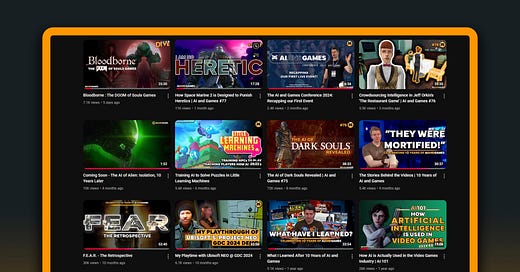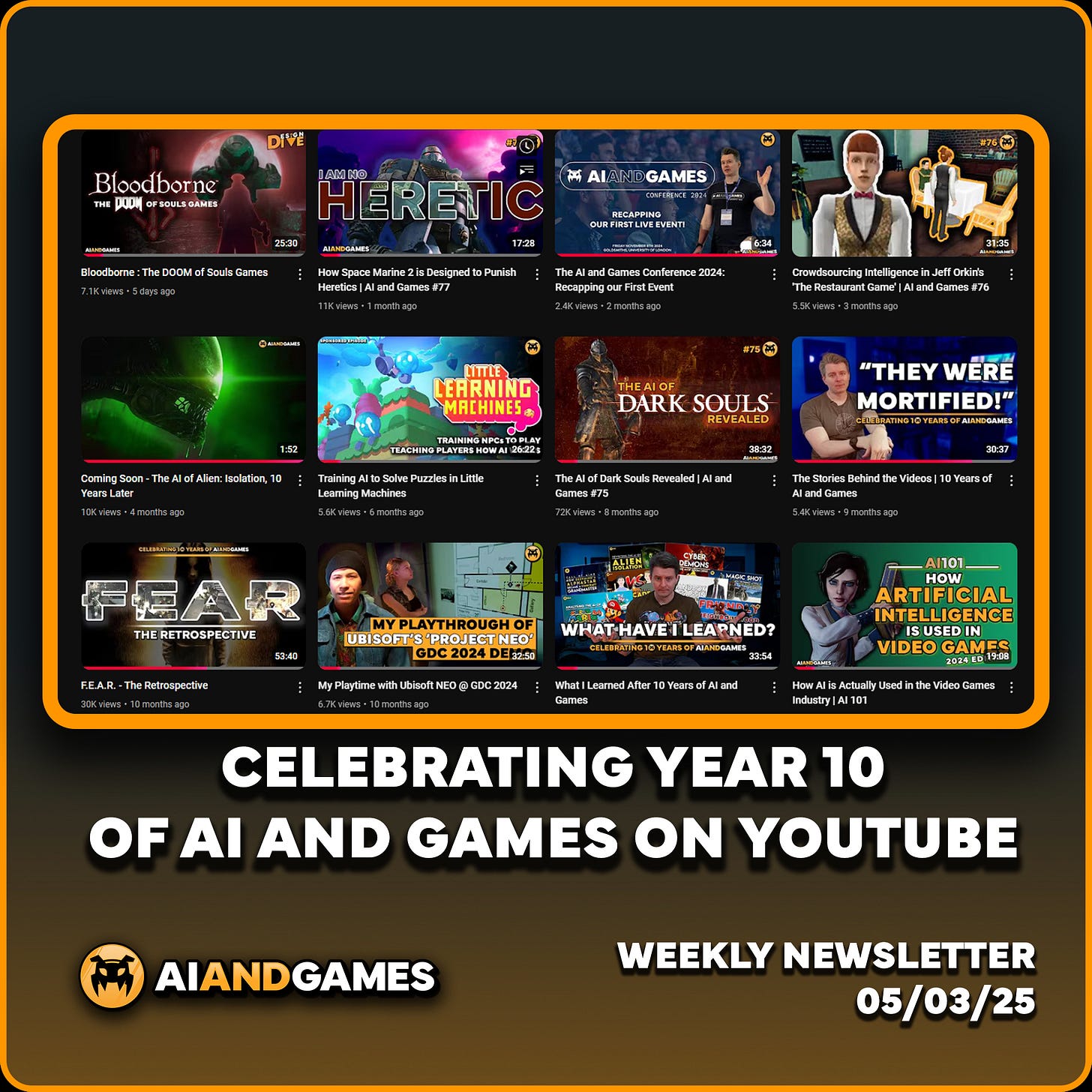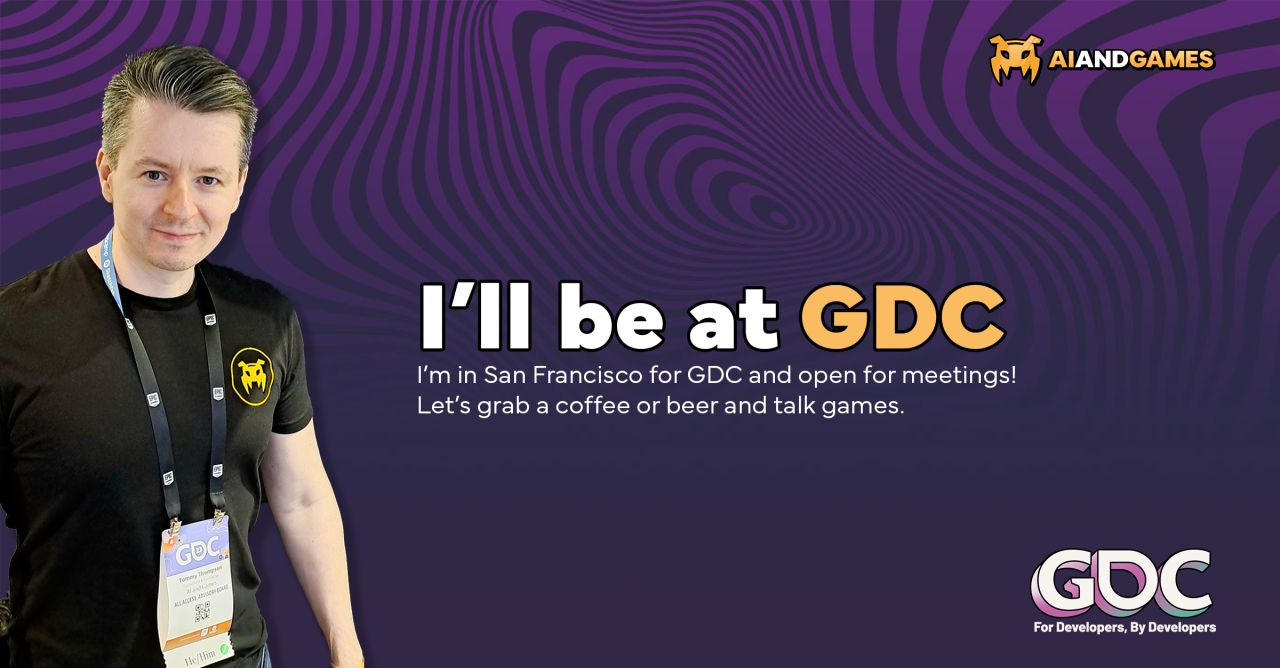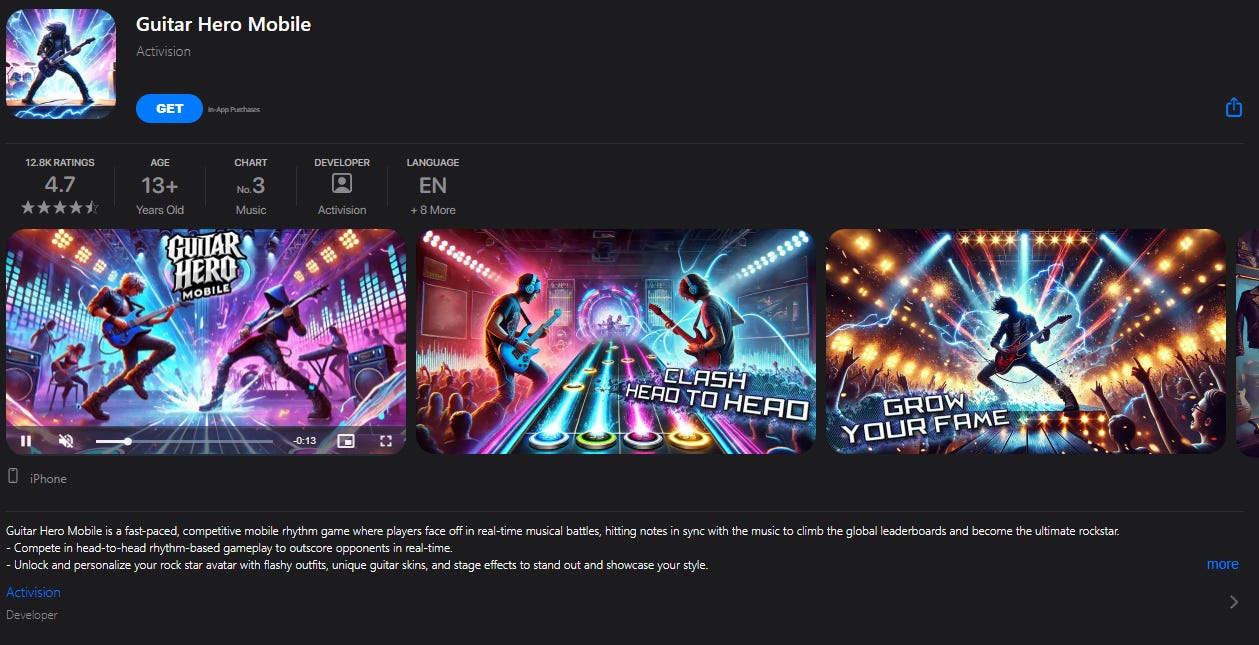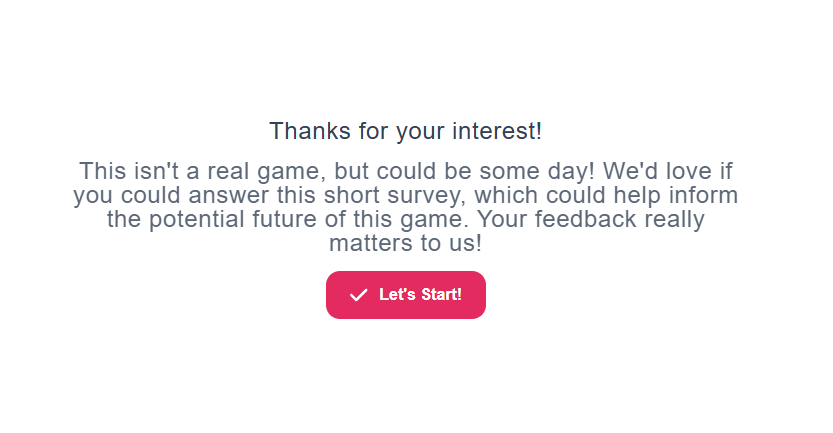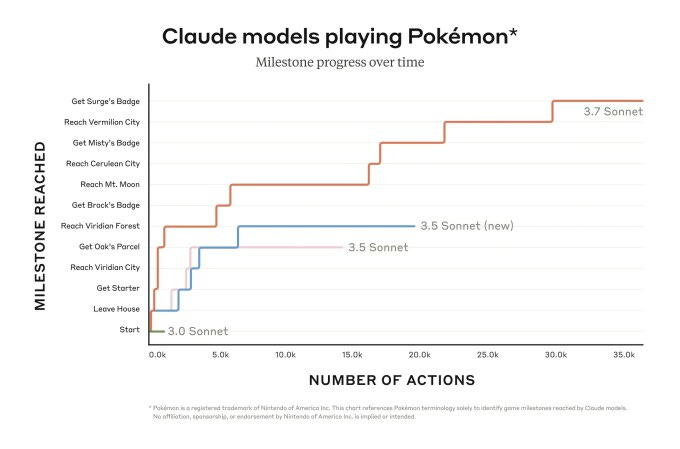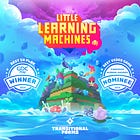Celebrating Year 10 of the AI and Games YouTube Channel
A bumper video issue covering many episodes we put together last year.
The AI and Games Newsletter brings concise and informative discussion on artificial intelligence for video games each and every week. Plus summarising all of our content released across various channels, like our YouTube videos and in-person events like the AI and Games Conference.
You can subscribe to and support AI and Games on Substack, with weekly editions appearing in your inbox. The newsletter is also shared with our audience on LinkedIn. If you’d like to sponsor this newsletter, and get your name in front of our audience of over 6000 readers, please visit our sponsorship enquiries page.
Hello and welcome to this week’s edition of the
newsletter. here as we’re celebrating the AI and Games YouTube channel’s birthday! Last weekend marked the 11th anniversary of our very first video all about the AI of Monolith’s F.E.A.R. So I figured why not have a slightly more light-hearted issue as I round up everything we published last year, and of course share the links for you to check out!So what to expect in this issue?
New AI and Games Conference talks on the emerging legal frameworks for AI in games, as well as the Learning Agents plugin in Unreal Engine!
SteamDB starts letting you filter out generative AI games.
EA released the source code to some classic Command & Conquer titles.
French voice actors take a stance against generative AI.
Activision used Generative AI to advertise games that don't exist.
Anthropic showcases their new LLM by having it play Pokémon!
Follow AI and Games on: BlueSky | YouTube | LinkedIn | TikTok
Announcements
Here we go, the quick round-up of everything
related, or adjacent!The Latest from the AI and Games Conference 2024
Last week we published two more talks from the 2024 AI and Games Conference to YouTube. Let’s take a look!
AI and the Law: What You Need to Know (Rupam Dave, Harbottle & Lewis) Despite AI technologies becoming increasingly pervasive in game development, many developers are not aware of the legal implications of using a variety of technologies in your tech stack. We welcomed Rupam Dave to our 2024 conference to give a breakdown of the key rules and regulations you need to be aware of when deploying machine learning in your projects.
Learning Agents in Unreal Engine (Brendan Mulcahy, Epic Games)
Released in 2024, the Learning Agents plugin for Unreal Engine provides a workflow for training and deploying NPCs through use of reinforcement and imitation learning algorithms. To get some insight into how you can use it yourself, we welcomed Brendan Mulcahy to our 2024 conference to show how Epic have used it to prototype bots inside their live service shooter Fortnite.
The Obligatory “I’m Heading to GDC” Graphic
There we go, here it is in all its glory. You’re only officially off to GDC when you have a cringe-inducing graphic with your photo on it. Also yeah, if you read this newsletter and wonder what I look like, there you go!
continues to grow, and we’re always on the lookout for new projects and collaborators in the gaming (and related tech) spaces. So if you’re interested in having a chat about:Technical and/or research consultancy for your project.
Professional AI training for your studio.
Partnerships on YouTube and/or this here newsletter.
Sponsoring or presenting at the AI and Games Conference
Or of course, if you just want to grab a coffee and having a bit of banter, that’s equally fine too. My availability is filling up quickly, so be sure to check what spots are left at the link below.
AI (and Games) in the News
Let’s take a quick look at what’s happening in and around AI in the games industry this past week.
Why Are No Games Companies Involved in the ‘Make it Fair’ Campaign?
So last week I mentioned that the Creative Rights in AI Coalition - a collection of bodies across press, creative industries and other affected sectors - is seeking to engage with the government on their AI strategy. But thus far, there are zero games companies involved. So, I was chatting about this with
last week as he was digging into the underlying politics of this for an issue of the . Worth a read!EA Releases Source Code to Classic ‘Command & Conquer’ Titles
In an era where it’s increasingly difficult to get access to classic games, Electronic Arts has released the source code to four classic titles: Command & Conquer, Command & Conquer: Red Alert, Command & Conquer: Renegade and Command & Conquer: Generals. Note that they only provide the source code, and no the full games. This is largely to support modding community and people who work in games preservation and restoration.
It’s worth mentioning we’ve already dug into the source code of the original game, and Red Alert back in 2020 as a slightly modified batch of source code was released as part of the Remastered Collection on Steam. You can catch that video below, while I start planning on a sequel that covers Renegade and Generals!
French Voice Actors Refuse Generative AI Concessions
As reported by Eurogamer (and other outlets) last week, a team of voice actors rejected a new requirement by a games publisher for waiving their rights for generative AI technologies to utilise their works in future. While the projects and publisher are not named directly, it is noted that the gentleman who voiced his frustrations with the situation on social media, Pascale Chemin, is the voice actor of Wraith in the popular live service shooter Apex Legends by Electronic Arts.
This all follows-up on both the ongoing strike action by SAG-AFTRA - which blocks working on ongoing projects as part of the strike action. A topic we saw crop up in recent months with both Genshin Impact and Destiny suffering from a lack of voice work in key updates. Plus, if it is true that it’s EA behind this current scuffle, it’s not a surprise given their overeager - and really shoddy - generative AI ‘splash’ at their investor call last year.
SteamDB Not Lets Your Filter Out Games Using Generative AI
SteamDB is a popular 3rd party platform for getting an insight into trends and overall popularity of specific titles on the PC distribution platform. It provides a valuable resource for both developers and players to help you find games that might of interest to you.
Last week via BlueSky it was announced there is now a means for users to filter out games in their search results that have an AI content disclosure, which more or less means that you can cut out any and all games that use generative AI tools - and have disclosed them publicly at least!
The way that a lot of this is worded, both in the original post and related media, implies a correlation between the use of generative AI and the perceived quality of the game. As conversations of ‘generative slop’ continue - largely reinforced by, well let’s face it, the internet filling up with AI generated slop - it continues to push towards a mindset that all generative AI is inherently ‘bad’. While it’s not as black and white as that, I most certainly respect and understand that viewpoint. As discussed last year, many players will reject the adoption of generative AI in any capacity wholeheartedly. Meanwhile just a couple of weeks ago we had indies rallying around their ‘No Gen AI’ seal of approval.
For every developer making a genuine effort to adopt generative AI technologies in sensible ways, someone exploits them in a manner that only pours fuel on the fire. And speaking of which…
Activision Tricks Fans With AI-Generated Ads for Games That Don’t Exist
I genuinely had to read this headline twice, because the first time I thought I was going nuts. As reported on social media and summarised by VGC, Activision created adverts for three mobile games: Guitar Hero Mobile, Call of Duty: Zombie Defender and Crash Bandicoot Brawl and started sharing them on Facebook and Instagram. The only problem is, none of these games exist.

The adverts are all achieved using generative AI, which is readily apparent in the Guitar Hero advert - I mean why would you use a technology notorious bad at drawing straight lines to advertise a game that is entirely about icons appearing on a fretboard of straight lines?
The really sinister part is that when you click to ‘find out more’ about each of these games, it links to a page on the mobile app marketing platform Geeklab. When you then try to get access to the game itself, it opens up a market research survey as shown below.
Messing your potential customers around like this does not strike me as sensible practice in the long run. I’d be curious to find out just how many people actually bothered to complete the survey after being tricked like this.
Anthropic’s LLM Claude is Playing Pokemon on Twitch
As published on their blog last week, large language model provider Claude (i.e. the other company that makes LLMs that isn’t Open AI, Google or Meta) is showcasing the capabilities of their ‘Sonnet’ model by having it play old-school Pokémon. Critically, this new LLM is built to `think’ more about what it’s doing before it aims to answer. To showcase how this new approach - where it reflects on decisions being made by the LLM before it responds to the prompt - compares to their previous versions by having it play Pokémon Red.
It runs using a modified setup, with a custom interface that interprets the screen of the game and maintains memory of the game state. Plus a built-in pathfinder that figures out how to get around the map. Thus leaving the LLM to plan out the strategy of beating the game. How does it know what to do? Well it’s able to fall back on all of those guides people published online on how to beat the game over the past 30 years!
You can watch a livestream now on Twitch were at the time of writing it is playing through Pokemon Red. When I last checked in it didn’t have a single fire Pokémon, and so I was pretty disappointed. I think we’ll try and circle back to this topic for a deep-dive in the future.
Celebrating the 10th Year of AI and Games YouTube Channel
If you’re new to this newsletter, you’d be forgiven for not knowing that all of this originally started on YouTube back in 2014. Last weekend on March 2nd was the 11th birthday of all things
. The birthday actually snuck up on me this year - I almost forgot to buy the cake! So I figured why not have a more light-hearted issue that digs into everything that was published on the main YouTube channel - though of course be sure to look at what’s been published on our second channel (AI and Games Plus) as well as the conference offerings!As you can see, I tend to stick to roughly one video a month, but it was really difficult to maintain that schedule last year as both Goal State and the AI and Games Conference went from ‘interesting idea’ to ‘oh my god we’re actually doing this’.
March: Reflecting on a Decade of YouTube
We kicked off celebrations with me reminiscing about the decade that has been. When
started back in 2014, the conversation around AI in game development was very different. How we used AI in games was in a different place, and a lot of the things we consider standard nowadays - and no, we’re not talking about generative AI yet - still didn’t really exist. Plus, I reflect on how my career has changed, and how all of this has reshaped both my perspectives and my overall knowledge of the sector.April: The F.E.A.R Retrospective
In April it was time to celebrate once again with something special. Back in 2014 I started AI and Games by looking at the AI behind the popular first-person shooter F.E.A.R. by Monolith from 2005. If you’re not familiar, F.E.A.R. is often heralded as one of the best examples of AI for enemy opponent non-player characters (NPCs) in games.
I’ve actually covered the AI of F.E.A.R. a couple of times. In the very first episode of AI and Games, and again in my AI 101 series in 2020 to celebrate the YouTube channel garnering 100,000 subscribers. But this time around I sat down with Dr Jeff Orkin, the AI programmer on the game, and we dig into how it all came together, how he couldn’t really do what he did in the early 2000s in a modern games studio, the misfires along the way, and the impact the game has had on the industry ever since. A feature length conversation and one I’m very proud of.
May: The Stories Behind the Videos
Sometimes when making the videos on AI and Games, there are weird things happening behind the scenes. But critically sometimes I get to make a video about a particular topic through serendipity: I just happen to meet the right person at the right time who would be willing to help me out. But also, sometimes I make a video and it has an impact on my life in other ways. Like that one time I made a video, and it led to me both being part of a documentary about a popular videogame, as well as working as a consulting designer on a new VR title.
I decided to spend May recounting some of the stories behind some of the videos I’ve made. Including Spec Ops: The Line, Sea of Thieves, Hitman, Alien: Isolation, Goldeneye and more!
June: The AI of Dark Souls
While the F.E.A.R. Retrospective is a very special episode for my personally, I do think the video on Dark Souls is the best thing I put together in year 10 of the great YouTube experiment. It’s a labour of love that I’d been chipping away at for years, and so I’m happy to explain how exactly the AI works not just in Dark Souls, but there’s an implication of how it may also works in future titles.
September: Training AI that Solve Puzzles in Little Learning Machines
So there was a bit of a gap between videos after the Dark Souls release. A big part of that was, quite simply, that I took a vacation in July. But of course we also were finalising the timelines for running the Goal State Kickstarter, but also we announced the AI and Games Conference in August. So my time was spread very thin.
All that said, I’m happy to say we came back with a really fun and interesting video as I sat down with the developers from Transitional Forms on their game Little Learning Machines. This game is all about training AI NPCs to learn how to solve puzzles, and you progress through the game by completing puzzles in specific ways. It’s a nice throwback to games like Creatures and Black & White from over 25 years ago, but using contemporary AI methods!
October: Teasing the Alien: Isolation Retrospective
So yeah, after I completed my work on the F.E.A.R. Retrospective I decided it might be worth trying to move forward with a similar video as Alien: Isolation turned 10 years old in 2024. This teaser trailer was released on the anniversary, but it only includes the voices of three of the interviewees I managed to secure for the project. We actually aimed to have this finished at the end of last year, but then we had more guests join us, including an official response from developers Creative Assembly.
This video is in the edit right now, and I hope to have an update for you soon!
November: Crowdsourcing AI Behaviour in ‘The Restaurant Game’
Episode 76 of the main AI and Games video series is effectively a sequel to the F.E.A.R. Retrospective as I continue my conversation with Jeff Orkin. In this video we pick up on where his career to him after working at Monolith, including his PhD to crowdsource intelligence for NPCs in a demo environment called ‘The Restaurant Game’.
Orkin nowadays is running his own game/AI company called Bitpart which is in essence expanding on the ideas of his PhD thesis from 15 years ago and applying them to games production pipelines. We see a little bit of where his work is headed, and no doubt we’ll have more to share on that in the future.
December: Rounding up the 2024 AI and Games Conference
In November my life was consumed by running the AI and Games Conference, and then the Goal State Kickstarter. But I’m happy to say both of them were very successful! So in December we rounded out the year as I published a brief vlog of the experience of running the conference. Fingers crossed we get to do it all over again next year!
January: The AI of Warhammer 40,000 Space Marine 2
We kicked things off in 2025 with a bang as I jumped into the world of Warhammer 40,000, and summarise one of the most exciting talks from our conference all about the AI of Space Marine 2.
What was most interesting about the Space Marine 2 presentation was how it adopts a lot of ideas and technologies I’ve covered in other games, ranging from Halo Infinite to Left 4 Dead, but in each case they rebuilt it to solve a specific game design problem that Saber Interactive faced. A great game, and I’m really pleased with how this turned out.
February: Design Dive Returns with Bloodborne
Last but most certainly not least, was the return of Design Dive: my video essay series all about game design. It doesn’t get that much love, and so it’s nice to come back to it periodically when I have a topic that warrants discussion.
After making videos discussing my experiences playing both Dark Souls and then Dark Souls II: Scholar of the First Sin, I figured let’s continue with my thoughts on Bloodborne and how the underlying design of the game seems the mesh quite nicely with the modern DOOM games? Fingers crossed I take a lot less time transitioning from Bloodborne to Dark Souls III - somehow the gap between videos on Soulsborne games was 5 years.
Wrapping Up
So yeah, we had a good chunk of content come out in Year 10, but Year 11 is aiming to have more content pushed across all of our channels - and then linked to right here in the newsletter. Right now we have more videos on the conference channel to launch, plus around 5 videos in active production right now and then even more in the pipeline. It’s going to be a wild year.
Of course we continue to summarise and publish this content here on the website and newsletter, and by supporting this publication you help these videos get made! So thank you for your continued support.
I’ll be back next week with more, and what better way to prepare for my trip to GDC than to spend our next issue taking apart their State of the Industry report? See you then!


